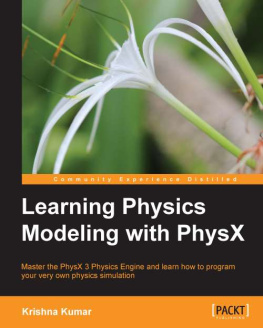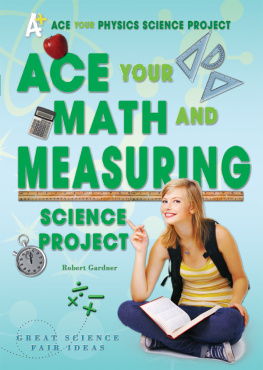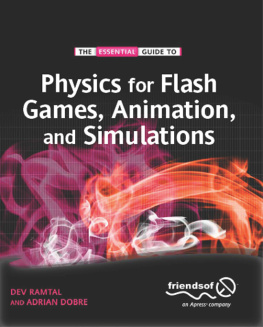David M Bourg - Physics for Game Developers: Science, math, and code for realistic effects
Here you can read online David M Bourg - Physics for Game Developers: Science, math, and code for realistic effects full text of the book (entire story) in english for free. Download pdf and epub, get meaning, cover and reviews about this ebook. year: 2013, publisher: OReilly Media, genre: Computer / Science. Description of the work, (preface) as well as reviews are available. Best literature library LitArk.com created for fans of good reading and offers a wide selection of genres:
Romance novel
Science fiction
Adventure
Detective
Science
History
Home and family
Prose
Art
Politics
Computer
Non-fiction
Religion
Business
Children
Humor
Choose a favorite category and find really read worthwhile books. Enjoy immersion in the world of imagination, feel the emotions of the characters or learn something new for yourself, make an fascinating discovery.
- Book:Physics for Game Developers: Science, math, and code for realistic effects
- Author:
- Publisher:OReilly Media
- Genre:
- Year:2013
- Rating:3 / 5
- Favourites:Add to favourites
- Your mark:
- 60
- 1
- 2
- 3
- 4
- 5
Physics for Game Developers: Science, math, and code for realistic effects: summary, description and annotation
We offer to read an annotation, description, summary or preface (depends on what the author of the book "Physics for Game Developers: Science, math, and code for realistic effects" wrote himself). If you haven't found the necessary information about the book — write in the comments, we will try to find it.
David M Bourg: author's other books
Who wrote Physics for Game Developers: Science, math, and code for realistic effects? Find out the surname, the name of the author of the book and a list of all author's works by series.
Physics for Game Developers: Science, math, and code for realistic effects — read online for free the complete book (whole text) full work
Below is the text of the book, divided by pages. System saving the place of the last page read, allows you to conveniently read the book "Physics for Game Developers: Science, math, and code for realistic effects" online for free, without having to search again every time where you left off. Put a bookmark, and you can go to the page where you finished reading at any time.
Font size:
Interval:
Bookmark:

Beijing Cambridge Farnham Kln Sebastopol Tokyo
If you purchased this ebook directly from oreilly.com, you have the following benefits:
DRM-free ebooksuse your ebooks across devices without restrictions or limitations
Multiple formatsuse on your laptop, tablet, or phone
Lifetime access, with free updates
Dropbox syncingyour files, anywhere
If you purchased this ebook from another retailer, you can upgrade your ebook to take advantage of all these benefits for just $4.99. to access your ebook upgrade.
Please note that upgrade offers are not available from sample content.
Simply put, this book is targeted at computer game developers who do not have a strong mechanics or physics background, charged with the task of incorporating real physics in their games.
As a game developer, and very likely as a gamer yourself, youve seen products being advertised as ultra-realistic, or as using real-world physics. At the same time you, or perhaps your companys marketing department, are wondering how you can spice up your own games with such realism. Or perhaps you want to try something completely new that requires you to explore real physics. The only problem is that you threw your college physics text in the lake after final exams and havent touched the subject since. Maybe you licensed a really cool physics engine, but you have no idea how the underlying principles work and how they will affect what youre trying to model. Or, perhaps you are charged with the task of tuning someone elses physics code but you really dont understand how it works. Well then, this book is for you.
Sure you could scour the Internet, trade journals, and magazines for information and how-tos on adding physics-based realism to your games. You could even fish out that old physics text and start from scratch. However, youre likely to find that either the material is too general to be applied directly, or too advanced requiring you to search for other sources to get up to speed on the basics. This book will pull together the information you need and will serve as the starting point for you, the game developer, in your effort to enrich your games content with physics-based realism.
This book is not a recipe book that simply gives sample code for a miscellaneous set of problems. The Internet is full of such example programs (some very good ones we might add). Rather than give you a collection of specific solutions to specific problems, our aim is to arm you with a thorough and fundamental understanding of the relevant topics such that you can formulate your own solutions to a variety of problems. Well do this by explaining, in detail, the principles of physics applicable to game development, and by providing complimentary hand calculation examples in addition to sample programs.
Although we dont assume that you are a physics expert, we do assume that you have at least a basic college level understanding of classical physics typical of non-physics and non-engineering majors. It is not essential that your physics background is fresh in your mind as the first several chapters of this book review the subjects relevant to game physics.
We also assume that you are proficient in trigonometry, vector, and matrix math, although we do include reference material in the appendices. Further, we assume that you have at least a basic college level understanding of calculus, including integration and differentiation of explicit functions. Numerical integration and differentiation is a different story, and we cover these techniques in detail in the later chapters of this book.
Most people that weve talked to when we was developing the concept for this book immediately thought of flight simulators when the phrases real physics and real-time simulation came up. Certainly cutting edge flight simulations are relevant in this context; however, many different types of games, and specific game elements, stand to benefit from physics-based realism.
Consider this example: Youre working on the next blockbuster hunting game complete with first-person 3D, beautiful textures, and an awesome sound track to set the mood, but something is missing. That something is realism. Specifically, you want the game to feel more real by challenging the gamers marksmanship, and you want to do this by adding considerations such as distance to target, wind speed and direction, and muzzle velocity, among others. Moreover, you dont want to fake these elements, but rather, youd like to realistically model them based on the principles of physics. Gary Powell, with MathEngine Plc, put it like this The illusion and immersive experience of the virtual world, so carefully built up with high polygon models, detailed textures and advanced lighting, is so often shattered as soon as objects start to move and interact.[] We think both these guys or right on target. Why invest so much time and effort making your game world look as realistic as possible, but not take the extra step to make it behave just as realistically?
Here are a few examples of specific game elements that stand to benefit, in terms of realism, from the use of real physics:
The trajectory of rockets and missiles including the effects of fuel burn off
The collision of objects such as billiard balls
The effects of gravitation between large objects such as planets and battle stations
The stability of cars racing around tight curves
The dynamics of boats and other waterborne vehicles
The flight path of a baseball after being struck by a bat
The flight of a playing card being tossed into a hat
This is by no means an exhaustive list, but just a few examples to get you in the right frame of mind, so to speak. Pretty much anything in your games that bounces around, flies, rolls, slides, or isnt sitting dead still can be realistically modeled to create compelling, believable content for your games.
So how can this realism be achieved? By using physics, of course, which brings us back to the title of this section, the subject of mechanics . Physics is a vast field of science that covers many different, but related subjects. The subject most applicable to realistic game content is the subject of mechanics, which is really whats meant by real physics.
By definition, mechanics is the study of bodies at rest and in motion, and of the effect of forces on them. The subject of mechanics is subdivided into statics , which specifically focuses on bodies at rest, and dynamics , which focuses on bodies in motion. One of the oldest and most studied subjects of physics, the formal origins of mechanics can be traced back more than 2000 years to Aristotle. An even earlier treatment of the subject was formalized in Problems of Mechanics , but the origins of this work are unknown. Although some of these early works attributed some physical phenomena to magical elements, the contributions of such great minds as Galileo, Kepler, Euler, Lagrange, dAlembert, Newton, and Einstein, to name a few, have helped develop our understanding of this subject to such a degree that we have been able to achieve the remarkable state of technological advancement that we see today.
Font size:
Interval:
Bookmark:
Similar books «Physics for Game Developers: Science, math, and code for realistic effects»
Look at similar books to Physics for Game Developers: Science, math, and code for realistic effects. We have selected literature similar in name and meaning in the hope of providing readers with more options to find new, interesting, not yet read works.
Discussion, reviews of the book Physics for Game Developers: Science, math, and code for realistic effects and just readers' own opinions. Leave your comments, write what you think about the work, its meaning or the main characters. Specify what exactly you liked and what you didn't like, and why you think so.

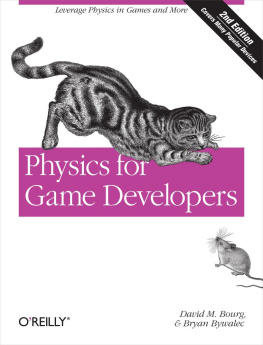
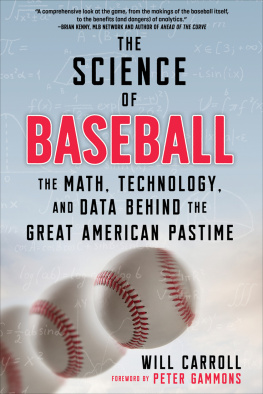

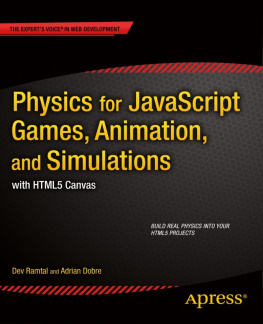
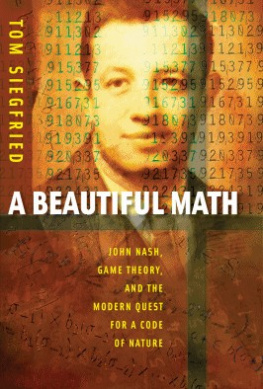
![Gabor Szauer [Gabor Szauer] - Game Physics Cookbook](/uploads/posts/book/121399/thumbs/gabor-szauer-gabor-szauer-game-physics-cookbook.jpg)
![Wendy Stahler [Wendy Stahler] - Beginning Math and Physics for Game Programmers](/uploads/posts/book/119084/thumbs/wendy-stahler-wendy-stahler-beginning-math-and.jpg)
